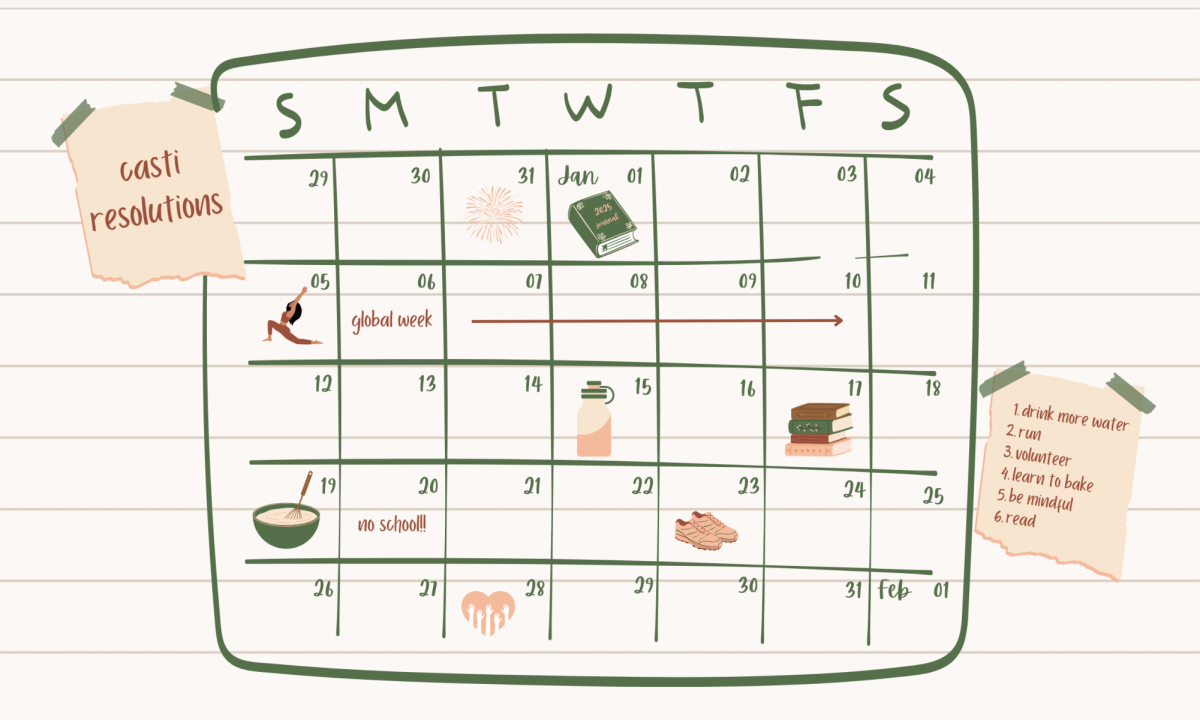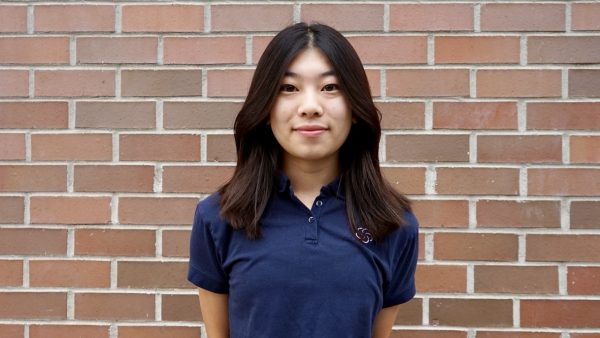When the clock hits midnight on Jan. 1 of a new year, many individuals break open their journals or a new Notes document to begin their “fresh start.” The determination associated with the new year really puts the resolve in “resolutions,” but how long does this tenacity last? Do people even create resolutions for New Year’s? Or is it a fantasy that just leads to failure?
Castilleja students and faculty share their own experiences with goal setting and reflect on how their 2025 resolutions have turned out so far.
Why have resolutions?
Resolutions take on various forms—fitness, lifestyle, work, etc.—that are meant to transform one’s mindset or place a target on a particular goal. Despite the awe-inspiring concept behind resolutions, Castillejans have varying opinions on the idea. Adya Chowdhury ’27 believes that “they are really useful because they give you a way to measure your progress… If you don’t have a goal… you’re shooting without a target.” Similarly, Poppy (Penelope) Scott ’27 said, “Resolutions are a good idea, as they let people set goals and clarify for themselves what they want for the year. But I definitely think that for a lot of people, committing to things for a whole year can be too daunting or too big of a shift in lifestyle.”
On the other hand, Noelle Madden ’25 critiqued the “often predominantly performative” concept behind resolutions, finding that “true change takes time and discipline, and it doesn’t matter what day of the week it is or whether it’s a new year.”
History teacher Ricardo Carmona’s approach is similar: “Rather than [thinking] ‘Oh, I’m going to wait until January to start,’ I try to do something every semester… to shorten the time. Instead of saying a year, I say three to four months.” Similarly, Spanish teacher and Class of 2027 Dean Jeff Mayfield breaks down his goals into themes and time periods.
2024 recap:
Castilleja students use strategies to prioritize their goals. To tackle her resolutions, Tallulah Turner ’28 keeps a sentence journal—a sentence a day for 5 years. “This is my second year,” Turner explained. “I set a medley of goals last year, [including] specific actionable ones such as writing in the journal every day, more vague ones like working out more and a couple for my relationships.” Turner uses her sentence journal as an easy way to record and reflect on her aspirations as time goes by.
Brooke Oliveira ’27 said, “I didn’t really have a 2024 resolution. I think it was just overall to be healthy and have fun, which was a pretty chill resolution that definitely for the most part happened.” To elaborate on what “happened,” a running injury encouraged Oliveira to approach life more “chill and relaxed so that I could really recover and prioritize my physical and mental health.”
Chowdhury set many goals for 2024, ranging from volunteering at her arts center to being elected as president of the class government. In order to achieve her goals, Chowdhury worked on taking early action. Chowdhury felt that “my motivation goes down… as time goes on, and my family… [is] very goal oriented… They’re the ones that forced me to do this [goal-setting], but now it’s like a habit for me.” Chowdhury went above and beyond with her resolutions in 2024.
Entering 2025:
Castillejans began 2025 with a new set of goals. Mayfield said, “I have a focus—a thematic focus for this period of the year, maybe January through midterms—which [is] basically organization and to follow through; just making sure that I… make good on whatever promises that I make to people.” Similarly, Carmona chooses a “not exactly seasonal thing, but more of a quasi-quarterly thing” to organize his goal-setting. In 2025, Carmona’s “main resolution is to be more present… being less on the phone, reading more, watching less TV—things like that.”
For Ella Kemp ’25, this year is about continuing her goals from 2024–daily exercise and time management–as well as developing new resolutions, such as diversified meals for a healthy diet and shifting her sleep schedule. Kemp said that she wants to “set goals for [her]self every night for what time to go to bed and use the Pomodoro method when doing homework.” The Pomodoro method is a popular study method that breaks up work into work periods and five minute breaks with timers, often accompanied by LoFi music.
Casti students like Scott also strive to minimize their screen time in order to achieve better time management. Decreasing screen time is a very common goal, made more feasible with devices like BRICK. Carmona shared the app BRICK, which pairs your phone with a physical block to lock and unlock your phone. Carmona found that “it is a little bit more effective than using the screen time thing because it’s external of the software system.” The physical aspect of the BRICK system helps keep people aware of picking up their phones, which in turn helps with self-accountability.
A Quarter reflection:
A few months into 2025, faculty and students reflected on their resolution progress, focusing on points of pivoting and growth. Scott found that reminding herself of the “why” behind her screen time goal was crucial for consistency. Turner “realized that [her] resolutions… were goals that [she] would have probably worked towards anyway. Even though [she] had completely forgotten the resolutions themselves, the sentiments had stuck around.”
Chowdhury made an important decision when it came to picking and choosing which of her resolutions she wanted to further in 2025. Deciding when and when not to cut back on our pursuits is an exercise in time management as well as an important step for juggling resolutions as a whole.
Kemp reported that she has kept up with her exercise resolution by playing tennis and doing cardio. “I have also been trying to eat more balanced meals, like poké bowls or other types of rice bowls with ingredients like edamame, carrots, cucumbers and avocados,” Kemp said. “I am proud of how I have started to diversify my diet more.” Kemp is also determined to improve her sleep schedule, especially since she is going to college soon.
Mayfield’s resolutions have also been successful: “The planning and organizing that I have done already is sustaining me now. However, I find that I must periodically carve out time to ‘re-organize’ my plans. I’m happy with my progress… my system isn’t perfect though, but what is?”
The best way to take action on one’s resolutions is to just start, so I have attached the links to some of the resources suggested by Castillejans in the article for my readers to check out for themselves!




